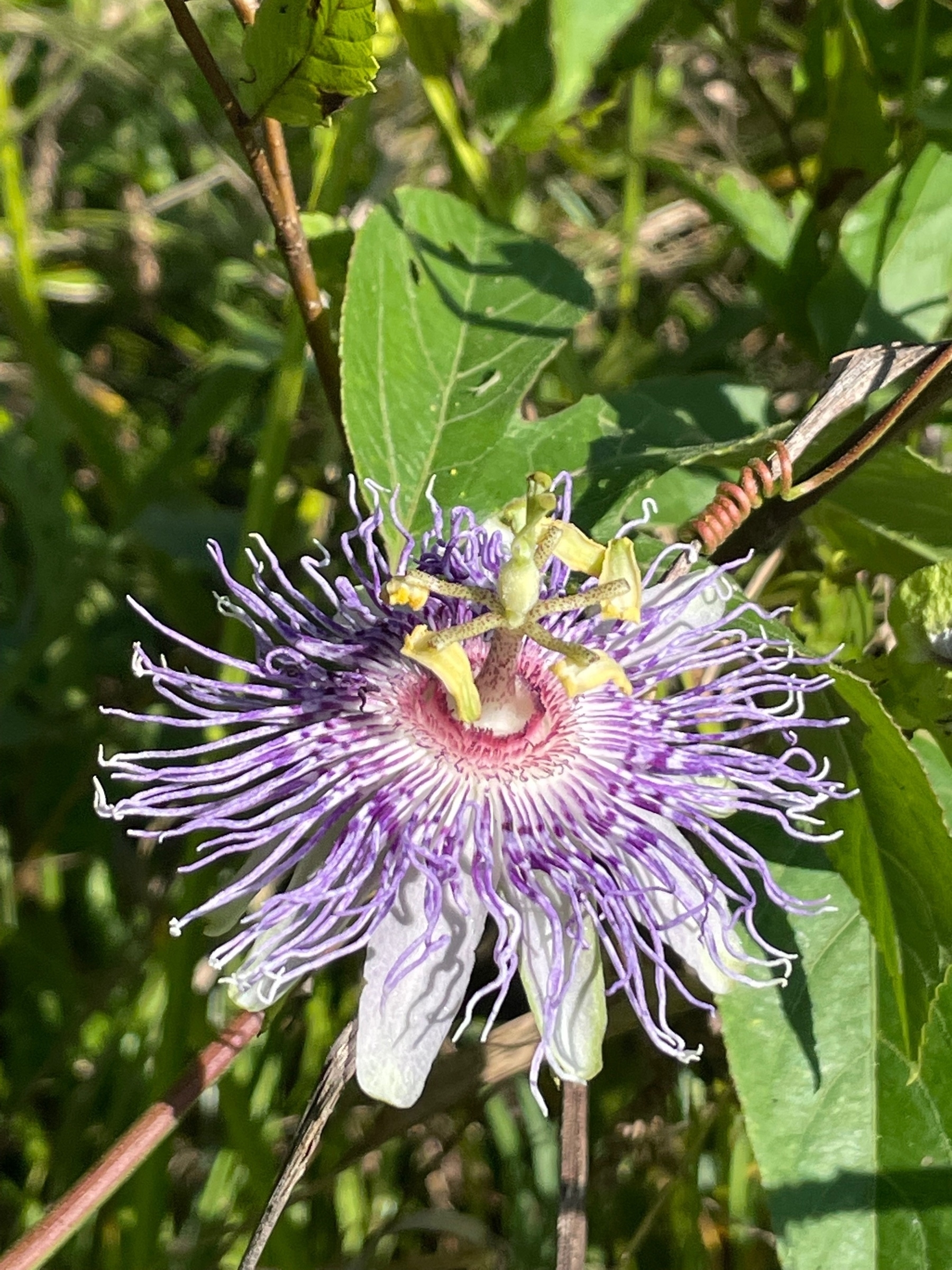A sunny 40 degrees today and I took a few minutes to uproot an apple tree which finally gave up the ghost. Then I did a bit of pruning on another and ended up dressing the pears and sour cherries too. The garlic seems to have come through the recent snowiness, which is nice. I’d like to add 1 or 2 more pears to go with the Keiffer and Bartlett - probably Bosc and/or Anjou.
Ordinary Time
Trying to put a few thoughts together on cycles and liturgy.
Having started a new liturgical year with Advent, we find ourselves now on the far side of Christmas, Epiphany, and the Baptism of the Lord. In short, the First Week of Ordinary Time. Ordinary Time, as a season, is broken into two parts by Lent, Easter, and Pentecost. This first part, occurring as it does after the birth and manifestation of The Lord, can be seen to correspond in a way to His life and ministry on earth.
The second part of Ordinary Time, then, begins after the Ascension. Having accomplished everything necessary for our salvation, the Lord departs and the Spirit accompanies the Church through time as it draws ever nearer to the End of Time - the feast of Christ, King of the Universe, which precedes Advent, and so the cycle continues. There’s nothing particularly ordinary about Ordinary Time, except that it feels like a chance to draw a breath or two after the Christmas season. This year we’ve got a fairly long ramp-up to Lent, too. But we’ll have the memorials of the saints, the feria, and everything else besides. Snow notwithstanding, the regular work and school schedules have started and our college kids have returned to campuses to get ready for the next semester.
The cycles of seasons, weeks, and hours show the sanctification of time itself - that strange and wonderful place where the transcendent and immanent meet. The God beyond all categories and definition and the source of all being deigned to become one of us. Still more, He invites us into the ongoing communication of Love that is His very nature - the Father to the Son, and the Son to the Father, the Spirit proceeding from both. We’re part of this conversation in our worship, our liturgy. What’s happening in signs and symbols here on earth is going on in reality in heaven. What’s here is real; what’s there is a more real sort of real. Super-real.
There’s a lot bouncing around in my head at the moment on this, almost certainly because of all the preparatory reading we’ve been assigned for our next class on Liturgy. I’ve managed to finish it well in advance and have started the book on which we’ll be writing papers - The Spirit of the Liturgy by Cardinal Ratzinger/Benedict XVI. It’ll probably go with me on this weekend’s retreat, but I’m also tempted to go with nothing except a bible and breviary. If memory serves, the retreat house has a decent little library so I’m sure I can find something if I need to. Maybe I’ll drag Talley’s Origins of the Liturgical Year for super-nerding on calendar stuff.
In other news, I made some orange marmalade this past weekend and it turned out beautifully. There seems to be something nearly magical about eating orange marmalade when it’s 25 degrees outside - as if we’ve somehow captured the tropics in a jar to eat on our toast. We got to babysit the new grandbaby, too, so it was a fabulous weekend all around. The snow has all melted and things have gotten back to their normal mid-South green and brown. It’s still plenty cold but at least the sun is out.
Currently reading: The Spirit of the Liturgy by Joseph Cardinal Ratzinger 📚
A heavy snowfall was nice, but nicer still is listening to it all melt at once.
Just a quick little board game that the kids have underway…
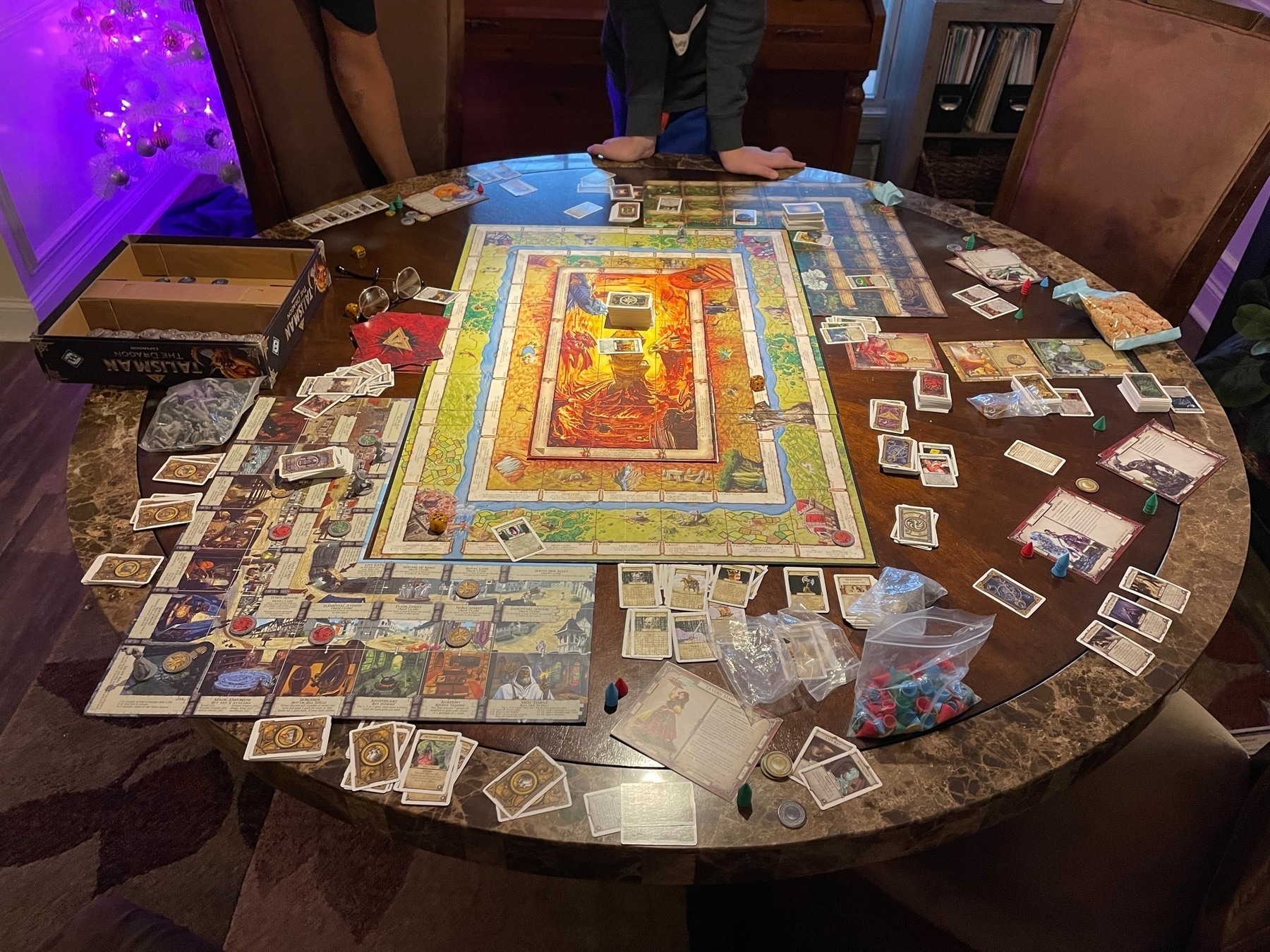
Reflections on St. Gregory the Great
"But in the midst of these considerations, we are brought back in the zeal of charity to what we have already said, which is that every preacher should be "heard" more his deeds than by his words...before any words of exhortation, they should proclaim by their actions everything that they wish to say."
St. Gregory the Great's Book of Pastoral Rule describes, in four sections, the individual qualities necessary for pastoral work, the ordering of a pastor's life, the methods by which he ought to preach, and the necessity of self-examination (or "return"). Gregory opens his book with a close look at the individual qualities to be sought (and avoided) in pastors. He follows with a description of a pastor's life - those habits and tendencies which either threaten or assist in his work. Having identified the ideal person and way of life, St. Gregory explains how he ought to teach. He creates an inventory of personalities based on opposites - the meek and the easily provoked, for example. Each of these demands a unique approach and method of counsel, and this section beautifully illustrates the deep understanding he has of the individual. He concludes with a brief call to the pastor to return to himself, recollecting his own weaknesses as a remedy to any pride that may arise as a result of his work. Though written in the sixth century, Gregory's book is rightly considered a classic and has much to say to modern clergy in general and to deacons in particular.
Gregory weaves several themes through the book which reduce to the following, namely that a pastor is a certain kind of person, who lives a certain way, and knows the people before him in a particular and intimate way. Moreover, he is able to encounter them as individuals, with their own particular needs, wounds, and motives. In this way, a good pastor is able to meet people where they are and speak to them in ways that they might hear best. Though some of his advice is not applicable in the modern period, much of it shows how constant many elements of human nature really are.
In the first section, Gregory outlines various undesirable qualities in those seeking to undertake pastoral work: they should be experienced, comfortable in leadership roles, able to put into practice what has been studied (and preached). In short 'he must be a model for everyone...devoted to the example of good living...dead to the passions of the flesh and live a spiritual life.' (p.43) In short, his life must be ordered towards Christ and not the pattern of the world. There is room for neither a desire for the honor that attaches to the role nor a reluctance to take it up because of fear or unhealthy detachment.
The deacon is configured in a special way towards Christ the Servant, and he is able to move and work in places that priests or bishops cannot - in workplaces, schools, and within families. Working closely in and among the people, a deacon is able to bring his life experience to bear in his sacramental work. He is expected to lead a spiritual life and integrate his various roles - father, husband, worker - into a unified ministry. These expectations presuppose that he can and that he's been called by God to do so - certainly, the periods of discernment are meant to explore this very thing.
Pastors are to be 'first in service,' modeling for others in their own lives what they ask of their flock. St. Gregory expresses a tension between a life in the world and the pull to monastic contemplation. On the one hand, pastors are called to be contemplative in nature, living closely to Scripture, meditating 'daily on the precepts of the sacred Word.' At the same time, he warns against withdrawing so far from the world as to be out of reach and goes on at length about the importance of addressing the physical needs of those in his care. In a contest between the two, Gregory favors engagement and direct service of others, among others. This closely comports with the mission of the permanent deacon which is ordered towards charity towards others 'in every stratum of society' as a result of his liturgical participation. In other words - everything a deacon does is in service to the others and their sanctification. This demands a deep life of prayer, and Gregory points the way to contemplation and lectio divina. We're not to lose ourselves completely in it, though. Deacons are not called to a cloistered life of prayer, but to a radical engagement with the world. This engagement must be leavened with prayer, however, or the engagement becomes pure activity confined to the temporal world, divorced from the spiritual and ultimately impoverished.
St. Gregory has a keen sense of psychology and leans on it to show how a pastor should advise individuals. He understands what makes people tick, and deftly identifies extremes of behavior by landing on the vice or sin at their mutual root. His insights, seen even across the centuries, are deeply humane and reflect his love for others and his desire to see them made whole and brought back to the fold. These are the teachings of someone who knows people well and has studied them at length. No one is beyond the reach or cast aside; there is a remedy for each. Where there is more than one problem to contend with, he wisely advises triage: focus on the more dangerous sin and leave the others to one side for the moment.
I will confess that I had some difficulty with the book in the earlier sections, but was thoroughly grabbed by the final eight dyads which treat pairs of sins - those who deplore sins of action and those who deplore sins of thought, for example. The sins themselves are not important, only patterns of life that surround them, patterns which, driven by individual habits and tendencies, require different pastoral approaches. As a result, his advice is applicable today as it was in the sixth century. I'm not sure if this is a tribute to his insight into the human condition or a statement on the relative sameness of people over the centuries. I suspect it is equal parts both. I attempted to read a similar book several years ago - The Spiritual Life by Adolphe Tanqueray. It was a difficult go; I didn't finish it. I can imagine possibly returning to it in the future if I want to understand a remedy for a particular situation, but I will most certainly be checking with St. Gregory beforehand.
One thing I noticed is that his book is purely focused on pastoral work with individuals (after solving for the pastor himself of course). There is nothing explicit here about sacraments, liturgy, or theology, but his book is deeply theological and only minimally systematic. God is our greatest good and the pastor shoulders the responsibility for guiding the flock to safety. The shepherd should be formed a certain way and live a certain life, mindful of himself and the role he plays as a spiritual builder of the people around him. He is bound to them closely and cannot ignore their material needs or disappear into detached contemplation in pursuit of his own ends.
In this way, pastoral work is deeply eucharistic - it occupies a vertical axis between Jesus Christ, the pastor himself, and the flock. It also by necessity lives horizontally: in and among the people in all of their stations of life, weaknesses, and beauty. This is the essence of the diaconate, as I understand it. Gregory's insights on the qualities of a pastor assume a priest but I saw very little here that wasn't supportive of the modern understanding of a permanent deacon.
St. Gregory places a tremendous emphasis on the interior life of the pastor; it's clear to me that the same holds for any pastor and perhaps a little more for a deacon living simultaneous family, professional, and ministerial lives. Though we are called to unify these roles, we must also acknowledge that each demands unique responses. All the more reason to reach for a solid interior foundation on which to stand. Having worked backward in time a bit for some of my personal reading, it's not difficult to pick out the streams of asceticism (and equally penetrating psychology) of the desert fathers and their spiritual descendants - Evagrius, Cassian, Benedict, and others - feeding Gregory's thought. It's becoming clearer to me that interior life and contemplative forms of prayer are going to be critical to my discernment and continued formation. Clearer still is the importance of a greater recovery of these spiritual treasures for others.
“A certain philosopher asked St. Anthony: Father, how can you be so happy when you are deprived of the consolation of books? Anthony replied: My book, O philosopher, is the nature of created things and any time I want to read the words of God, the book is ever before me.”
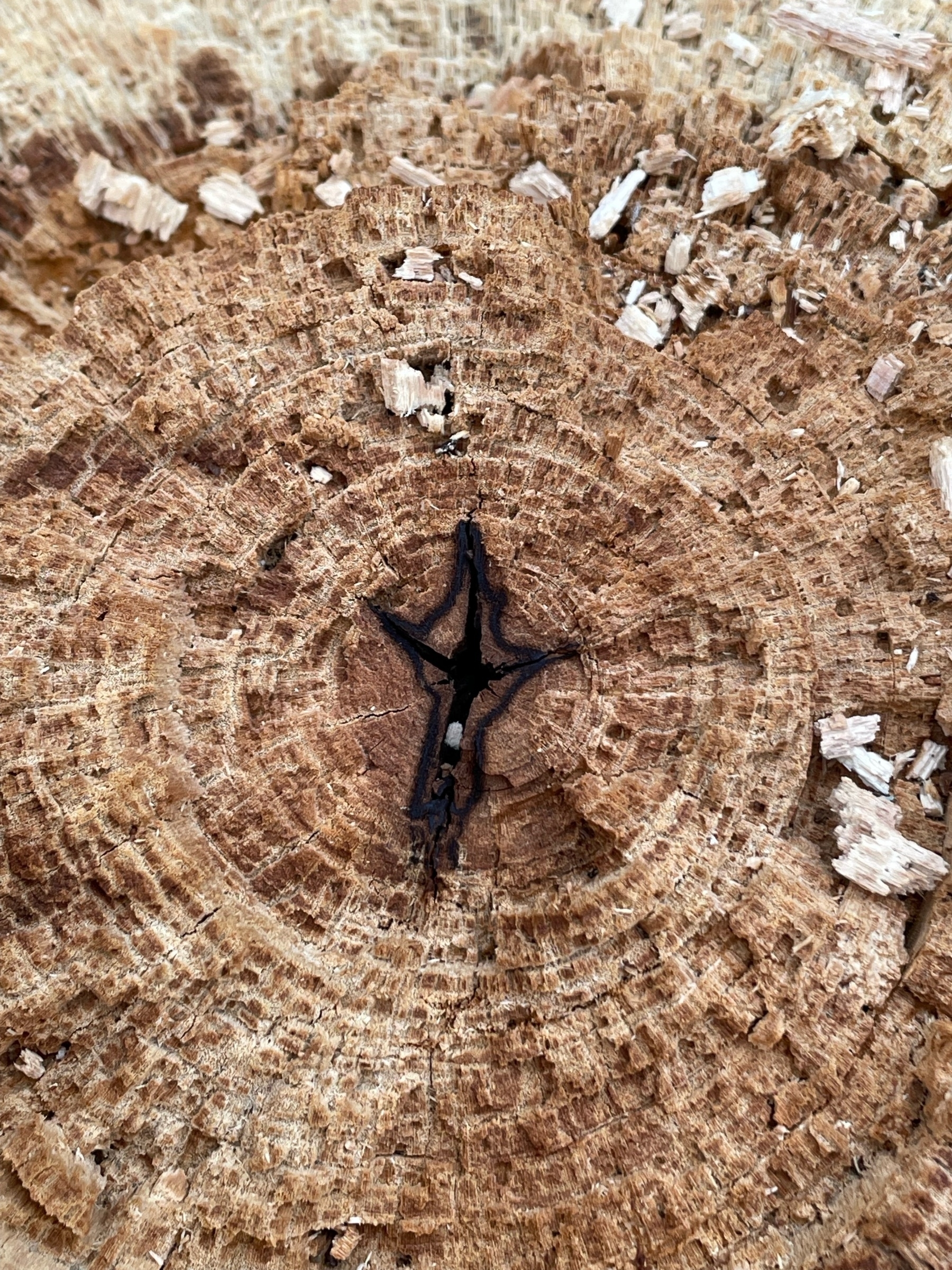
Into the Silent Land
This past weekend was a deep dive into the main themes of Christian spirituality, with a particular focus on contemplative prayer and lectio divina. Our instructor had us read Into the Silent Land by Father Martin Laird, and what a beautiful little book it is. I'm nearly finished with St. Gregory's Book of Pastoral Rule. I will be spending a portion of my ongoing time off working on a paper before pivoting to the predatory reading on next month's class on the sacred liturgy - Ratzinger's Spirit of the Liturgy, Martimort's The Church at Prayer, a grab bag of General Instructions, and assorted other miscellanies.
The materials for this past weekend, however, encouraged my ongoing interest in the desert fathers, so I've got the first volume of The Philokalia sitting in front of me along with a small collection of Evagrius (The Pratikos & Chapters on Prayer). Father Laird's book comes at an opportune time for me, and I've already begun to put some of its practices to work in my daily prayer and meditation. He posits a stunning notion, perhaps to the world, even scandalous: we cannot be separated from God even if we try. He is the very ground of our being, and the illusion that we can part ways from Him results from the noise and distraction with which we fill our minds. Sin can cloud this even further, but our very being is fundamentally and teleologically ordered towards union with Him, no matter how much we believe to the contrary.
It is difficult - maybe impossible - to realize this in the noise of the modern world. None of this is new - the fathers who fled to the desert sought the silence there for the same reasons. Perhaps uniquely, we have created the option of total distraction at every moment - a fountain of image and noise that knows no bottom or end. We must, in every moment we can, steal moments of quiet. If we can find a quiet place, this is good, but this is not enough, for this silence is only exterior. We must seek for silence within us - the silent land which is our birthright. This is difficult, and we have not done ourselves any favors in this respect. But it is there and has been waiting for us from the beginning of our being. It is for us to reclaim it, to grope our way to it, and to rest there again. This is the place where we can hear Him.
How many of us long for the silence of the desert? Or the peace of the woods? We may be fortunate enough to find ourselves near these places and seek refuge in them, but there is a silence that waits within us, beyond the clamor of our thoughts, fears, and cares.
We are perhaps too talkative, too activistic, in our conception of the Christian life. Our service of God and of the Church does not consist only in talking and doing. It can also consist in periods of silence, listening, waiting. Perhaps it is very important, in our era of violence and unrest, to rediscover meditation, silent inner unitive prayer, and creative Christian silence.
— Thomas Merton, "Creative Silence"
This sense of separation from God and from one another, this profound ignorance of our innermost depths, presents a singularly convincing case. This is the human condition, and we have all eaten of its fruit. But this is a lie. It is a lie spun largely out of inner noise and mental clutter. It is the inner video that plays again and again and again and steals our attention so that we overlook the simplest of truths: we are already one with God. The Christian contemplative tradition addresses this very problem by exposing the lie and introducing stillness to the mental chatter.
Martin Laird, Into the Silent Land
I decided to splurge on a new keyboard for the office and opted for a mechanical one to replace the janky one I’d been using for a few years, and which I think I found someplace. Oddly enough, the USB model gave me all sorts of issues. Logitech does not officially support Linux, and I fought it for a couple of hours before exchanging it for a Bluetooth model which…just sort of worked straight out of the box. Go figure.
The difference is simply amazing. If you do any amount of typing on a regular basis, I urge you to give one a try. I was going to just order one online but really wanted to feel the thing in action so I limited myself to what I could test-drive at the local big-box electronics store. Friend, you will not regret it. Your fingers will thank you!
Very busy around here lately. Among other things, we welcomed our first grandson to the world! Everyone is doing very well, and it's great fun to see all of the new aunts and uncles jumping feet-first into the roles.
This month's formation session is an introduction to spirituality. On deck is liturgy, followed by Foundations (two months), which I assume is an intro to theology proper. The syllabus for this year winds up with Old Testament (another two months), and this looks to conclude the Aspirant year material. I've looked at the next couple of years' worth of classes, and they look to go into considerably more detail.
The books: Christian Spirituality: Themes from the Tradition, The Pastoral Rule of St. Gregory the Great, and Into the Silent Land. There are times that I feel like I'm threading two needles at once. First - how can I better understand (and develop) my own spirituality? The readings (and required reflections) prompt some interesting interrogations of my own practices and routines, especially around spirituality in terms of community. It is interesting to see that I've scratched my way towards some of these things already.
Secondly, how will I communicate these things to others? I imagine the first thing will be to extricate notions of spirituality, meditation, and the like from the culture and recast them in terms of the Christian life. For one, these are methods that are not ends in themselves. If love for neighbor has not increased, the time and effort have been wasted. The Desert Fathers knew this and preached extensively on the subject. Regarding fasting, for example, we read in the Institutes. Cassian asks why the monks they were visiting have dispensed with their fasting during their visit. An elder replies:
"Fasting is ever with me, but since I am soon going to send you on your way I shall not always be able to keep you with me. And fasting, as beneficial and necessary as it may be, is nonetheless a gift that is voluntarily offered, whereas the requirements of the commandment demand that the work love be carried out. And so I welcome Christ in you and must refresh him. But when show you on your way I shall be able to make up for the hospitality extended on his behalf by a stricter fast of my own. For 'the children of the bridegroom cannot fast as long as the bridegroom is with them,' but when the bridegroom departs, then they will rightly fast."
(John Cassian, The Institutes, 5.XXIV, trans. Ramsey, 132)
We had an excellent Thanksgiving around here. A few of us filled out last-minute entries for our town's annual 4-miler and we were all grateful that the rain held off until after the event. Dashed home and got the turkey into the grill and spent the rest of the day in the kitchen on clean-up duty for successive waves of food prep.
Today: recovery, last-minute paper edits, and general hanging-around. Tomorrow looks much the same. Hope everyone is doing well. God bless!
Visiting our niece, who is studying engineering, and taking a stroll through the campus bookstore. 👀
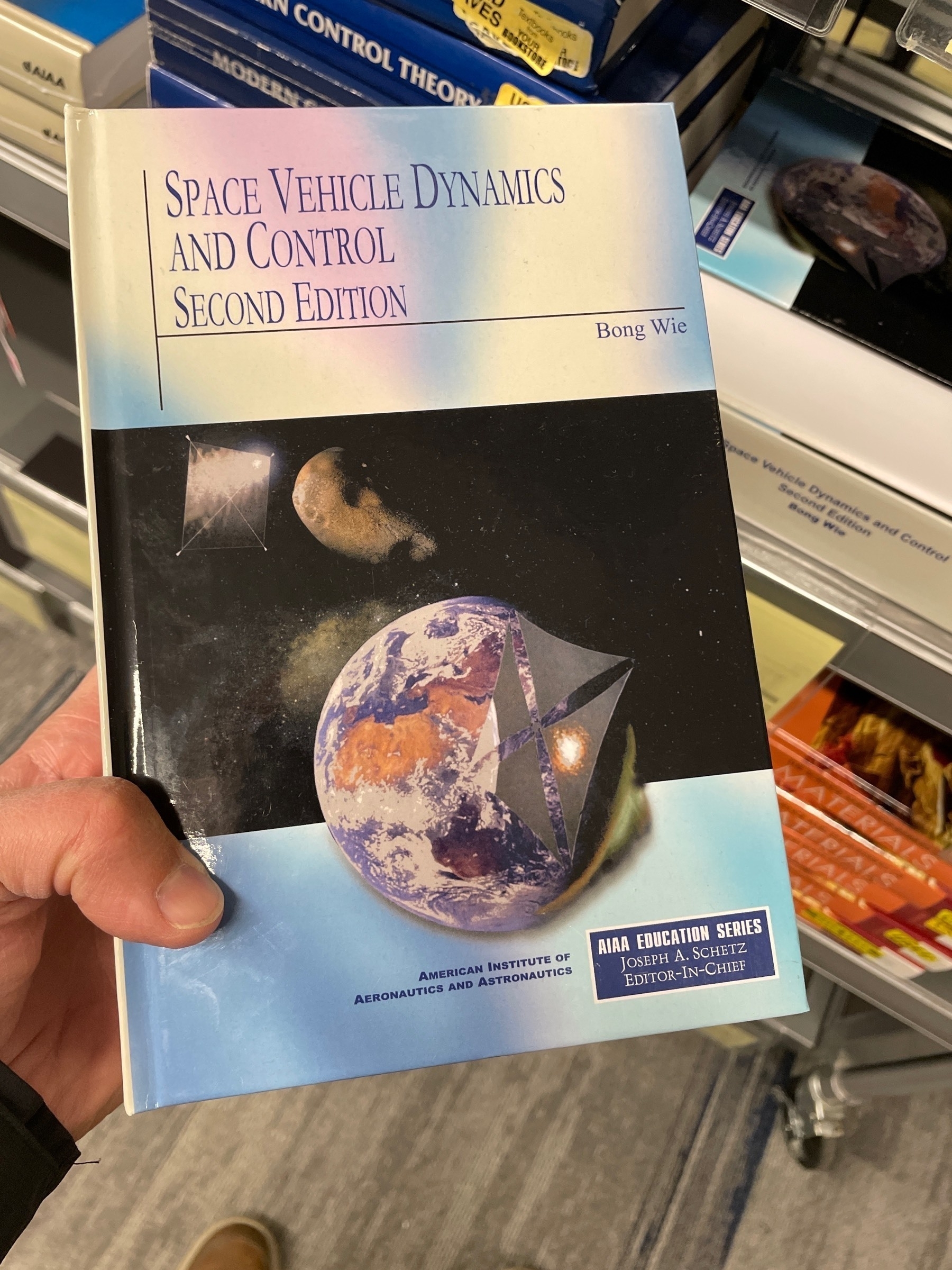
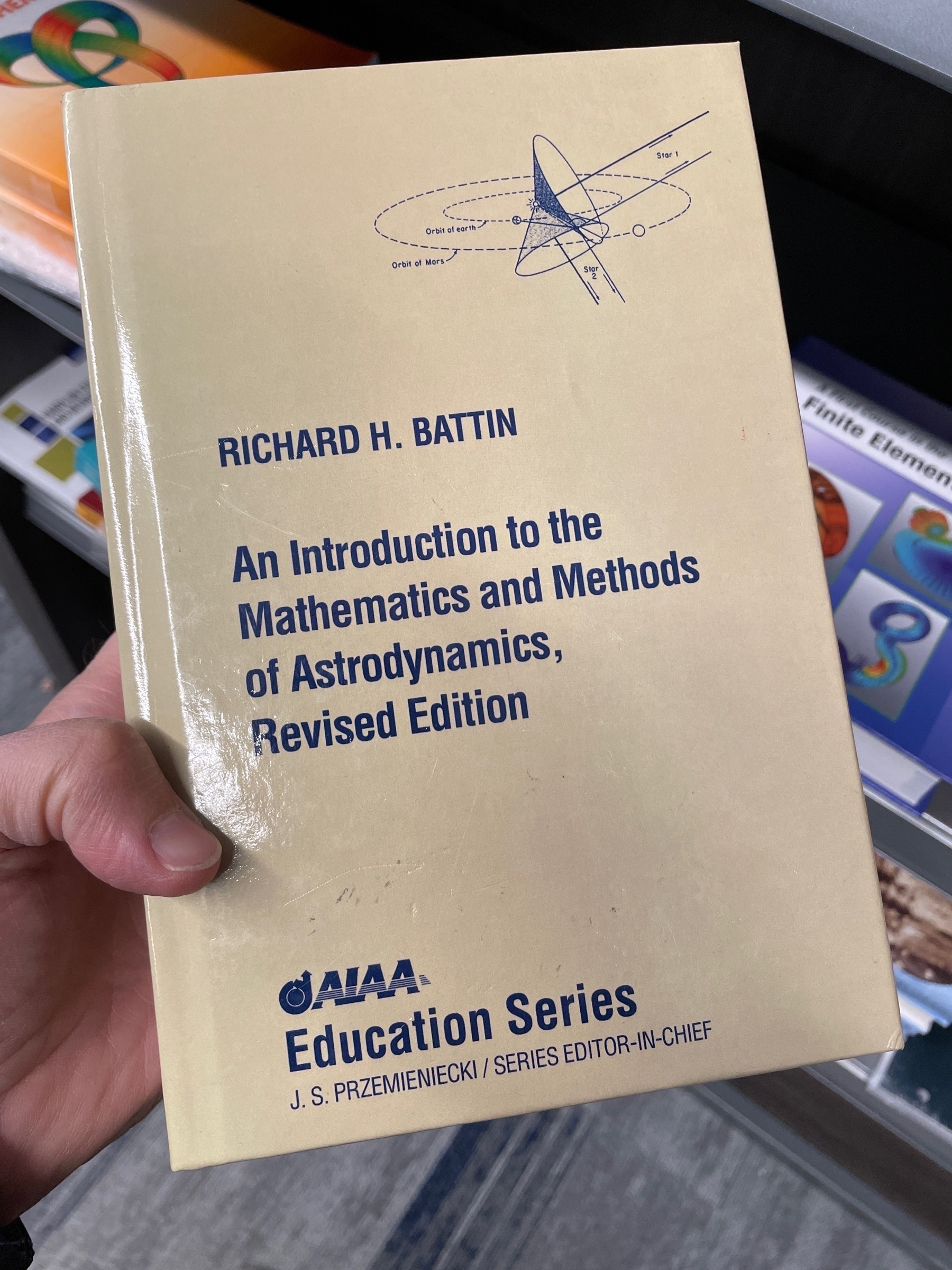
Traveling for work for the first time in nearly two years! Feels kinda good tbh.
Day 3 of a formation weekend which has focused on OT exegesis.
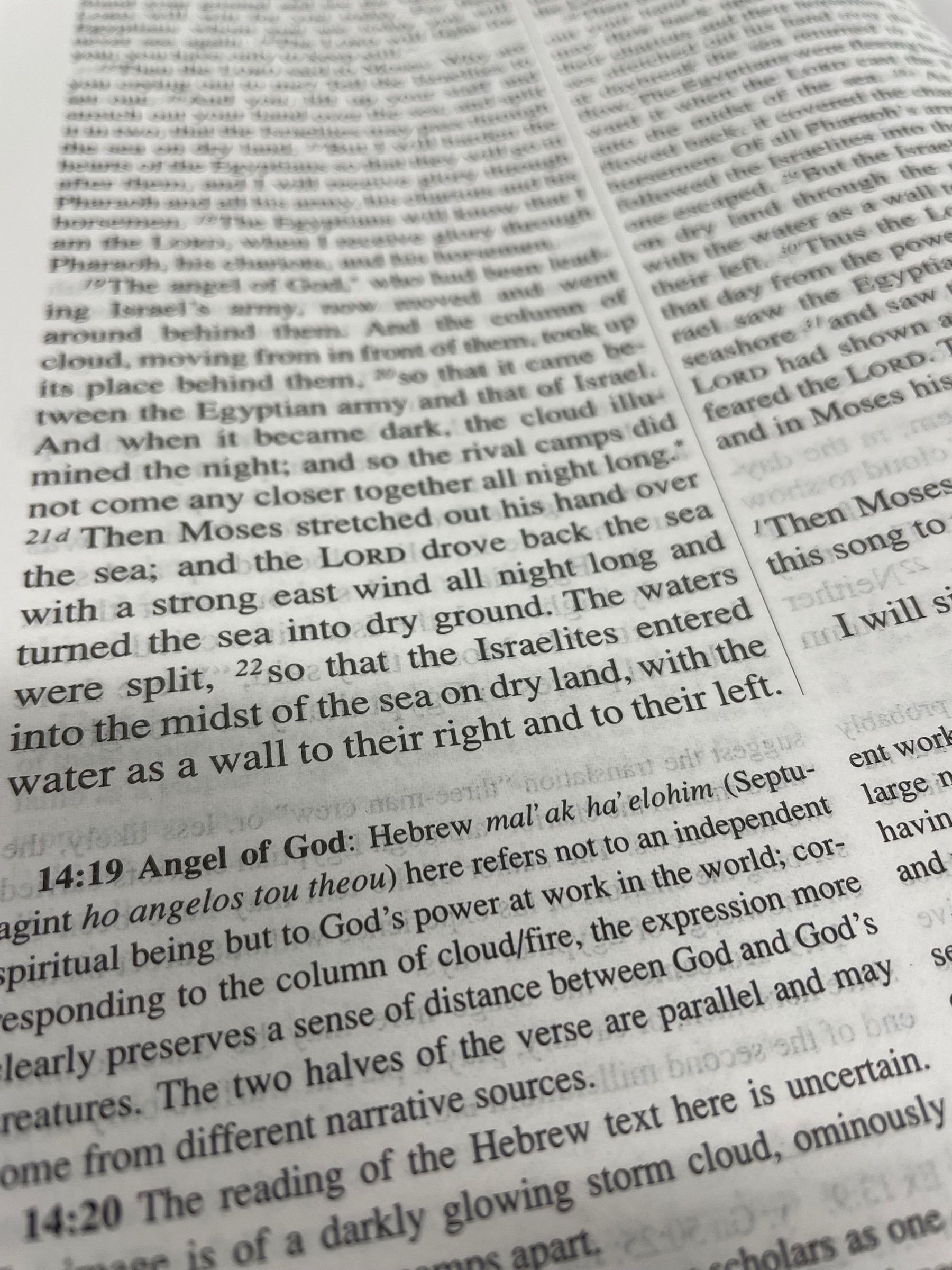
Mushrooms, Montgomery Bell State Park
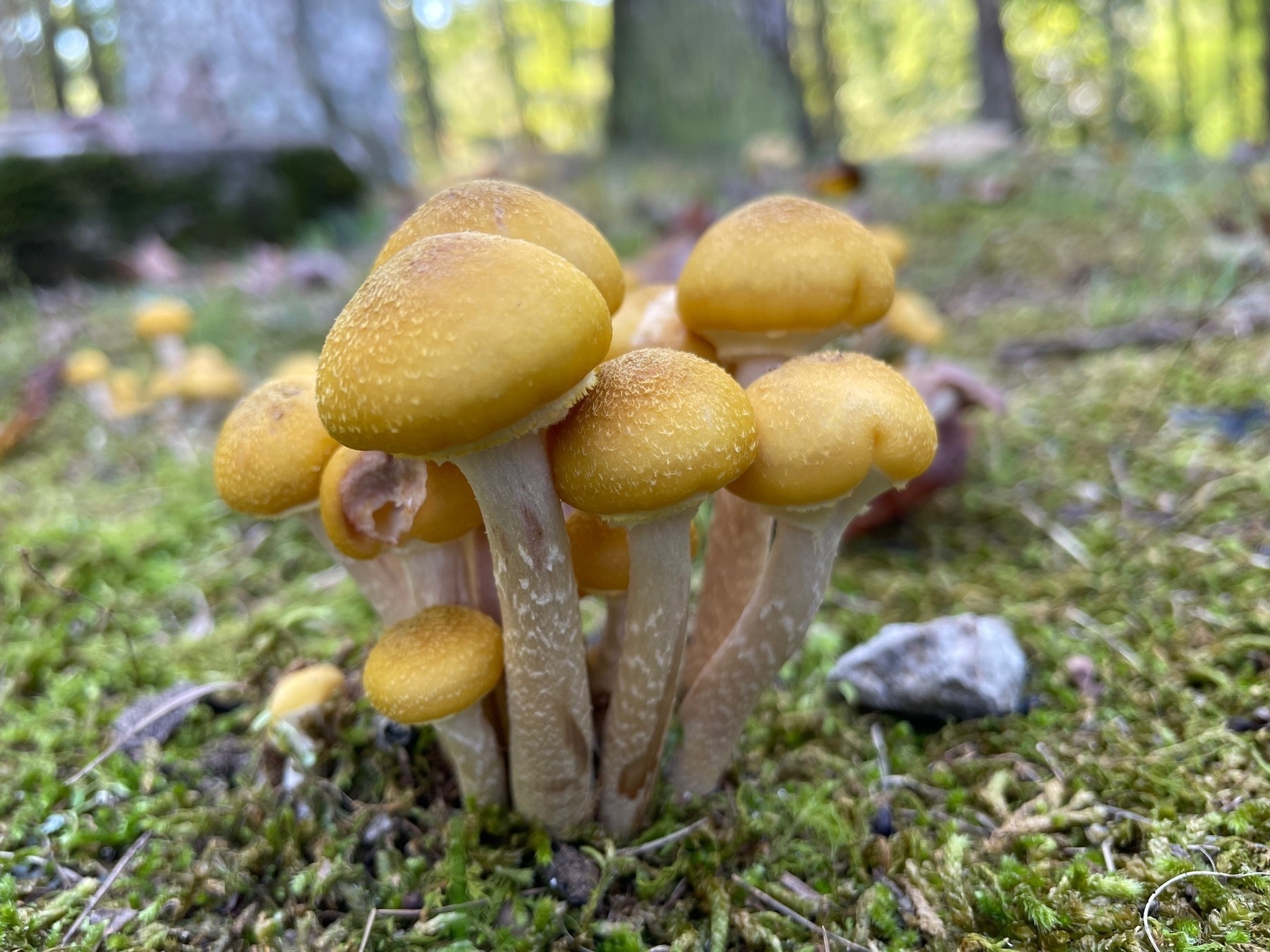
Moths taking off at 6000fps, (h/t metafilter). Did you know moths were so fluffy? Now you do!
Habanero jelly!

All of my radios are croaking! Recently the scanner had to go back to Uniden for a repair that luckily occurred with about three days left on the warranty. Yesterday I re-imaged the Zumspot, and when I went to test it out, I found my TH-D74A doing the flashing-Kenwood-logo behavior. According to Google, this is a sign that the charge controller needs replacement. I dropped an email to Kenwood and got a very quick on the repair process. This one will cost me as the unit is about a year out of warranty. In the meanwhile, I’m going to try to get this $16 DMR HT working with the hotspot.
This weekend we’re off to a retreat, and I’ve been working on getting my last two papers in for our most recent class on church history. I think they’re about ready to be submitted, and I’ll be checking to see which books for the next class - an introduction to scripture - will travel well. I never have as much free time as I expect on retreats, though. We’ll see. In any event, it’ll be nice to get away for a couple of days, and the topics look pretty interesting.
This is another formation weekend - the second part of a church history survey course. Reading assignments are set well in advance, and we've got questions to answer in the weeks leading up to the session. The assignments have largely been source documents of one kind or another, and wrestling with them has been an experience, to say the least. The first portion of the course was early history, which amounts to only about 1,000 years! This weekend will cover the late medieval period, through the Reformation, and into the modern era. Next month's session is on scripture, and the next stack of books is already ready to go.
Sprinkled throughout the marathon lecture sessions, we have time for prayer, Mass, and special sessions focused on specific formation topics. It is all a heck of a lot of fun and also thoroughly exhausting. I had my graduate school interview last week and was officially admitted, so it's all moving along for sure! I should probably buy a t-shirt or something.
My reading list is entirely related to classwork these days. I may be able to get through the latest wave of magazines at some point by Sunday night; we'll have to see.
I've been listening to the Christianity Today podcast The Rise and Fall of Mars Hill, and it has been great so far. I try to follow cultural-religious trends closely and really appreciate insider's look at the roots of the megachurch movement generally (and the demise of one in particular). So far, it's been equal parts fascinating and heartbreaking.
The garden is mostly done for the year, though you'd never guess by looking at it. It's so full, lush, and overgrown...with weeds. Only the hot peppers are still yielding heavily. I've dehydrated most of them so far but will probably start turning them into jelly next. I'm anxious for the garlic to arrive, but it looks like it hasn't shipped yet.
Tickseed Beggar-ticks
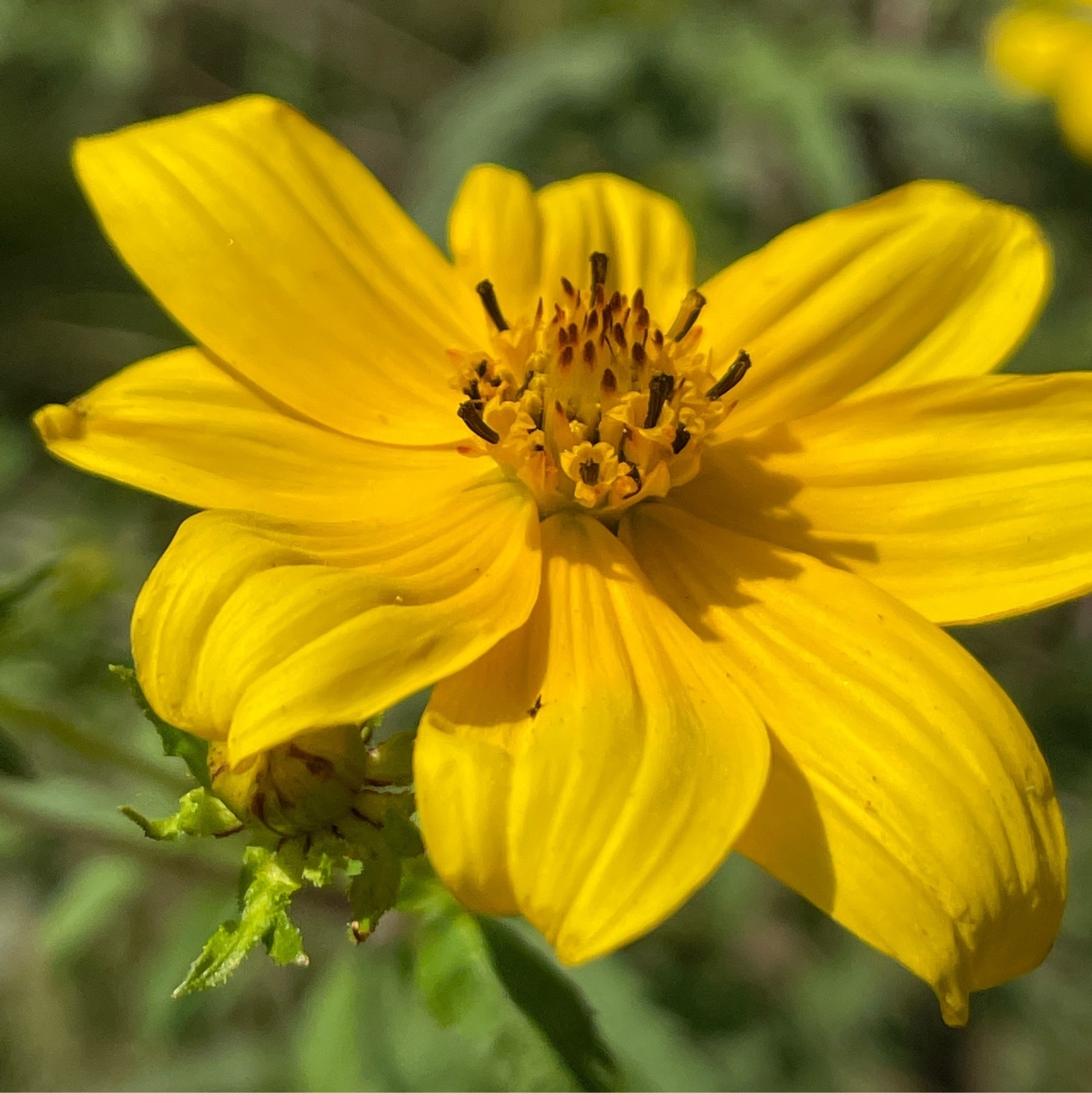
White-marked Tussock Moth caterpillar

Last step in the formal graduate admissions process is the interview, which has now been scheduled. Almost there!
Passionflower, one of our state symbols
